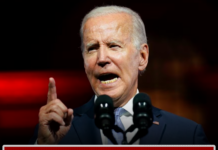In 2017, Republicans reformed the tax code in the traditional sense. We broadened the tax base by reducing tax preferences for special interests in favor of lower overall tax rates.
We also had several other goals including, maintaining the progressivity of the tax code, cutting taxes across all income groups, predominantly for the middle-class, and making our business tax system globally competitive. We were able to accomplish each of these goals.
On average, taxpayers across all income levels saw a tax cut. Middle income taxpayers saw the largest percentage decrease in their tax bill. Also, we not only maintained the progressivity of our tax code, we made it more progressive.
Moreover, TCJA brought our business tax system and rates in line with the rest of the world.
It put an end to the practice of corporations moving headquarters offshore to avoid paying the highest tax rate in the developed world. It incentivized American businesses to invest here at home and made America a more attractive place for foreign companies to locate.
Pre-pandemic, these reforms resulted in the highest economic growth, the lowest unemployment and biggest wage gains we’d seen in decades.
Now, post-COVID, Democrats assert a massive expansion of government is necessary to “Build Back Better.” But, that’s exactly backwards.
America will “Build Back Better” post-pandemic, but it won’t be because of government. In fact, it’s already happening due to the perseverance of the American people and the ingenuity of American entrepreneurs and job creators.
Unfortunately, the tax bill unveiled by Ways and Means last week will only hinder our path back to prosperity. Their bill is the exact opposite of tax reform. It would raise marginal tax rates on individuals and small business to levels not seen since before the 1986 tax act. Moreover, our corporate tax rate would once again be the highest among our major trading partners.
These tax hikes will slow our recovery from the pandemic and reduce capital investments. This will result in fewer jobs and reduced wages. It will reinvigorate corporate inversions with major companies fleeing overseas.
In conjunction with raising tax rates, they narrow the tax base in favor of social and corporate welfare handouts. I say handouts because the majority of their bill’s $1.2 trillion in tax cuts aren’t tax reductions, but pure spending.
According to the Joint Committee on Taxation, $689.7 billion or 57 percent of their so-called tax cuts are actually outlays. That’s a fancy way of saying Treasury is going to write the individual or business a check that may exceed any taxes paid.
This is turning our tax laws and the mission of the IRS on its head. No longer would the tax code primarily be about raising revenue necessary to fund essential government functions. It would be about doling out cash to those Democrats deem worthy.
Given their rhetoric, you might think these types of cash payments would be reserved for low-to moderate income individuals and families. But, even wealthy individuals buying electric vehicles, millionaires investing in green energy projects and multibillion dollar corporations will be in line for government checks.
This is astonishing coming from a party claiming to be outraged by wealthy individuals and profitable corporations paying zero tax. As recently as March of this year, President Biden castigated Amazon for not paying “a single solitary penny in federal income tax.” If he finds that unacceptable, then he should be beside himself about the House Democrat’s tax proposal.
Under their tax bill, a company such as Amazon could have an effective tax rate of not just zero, but negative. In other words, favored companies could receive a check from the government in excess of any income taxes owed.
What I’ve outlined here is a small sample of the concerns I have with the House proposal. Their bill is so chock full of tax giveaways, counterproductive tax policy, and punitive tax hikes that one former Democrat Senate staffer is quoted in Politico calling the House approach “laughable.”
I hope my Senate Democrat colleagues do better. It will be hard for them to do any worse.
















